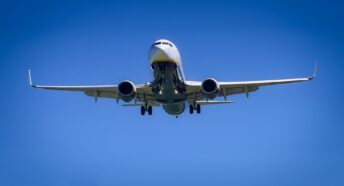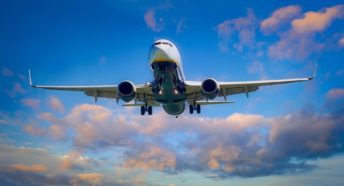Enough is enough when it comes to aircraft noise say community groups from across the UK
On Monday 22 May 2017 community groups representing hundreds of thousands of UK residents delivered a statement to Number 10 demanding that the next government takes action to reduce aviation noise and emissions.
The groups are seeking a new policy on aircraft noise and tough regulation of the aviation industry that balances the interests of people living near airports and under flight paths with the demands of the industry for more flights.
Charles Lloyd of the Aviation Communities Forum said:
“Anyone who lives near an airport expects some noise. But the changes caused by new concentrated routes – motorways in the sky – and the growth in flight numbers are having unacceptable affects on people’s lives, up and down the country.”
“For far too long the aviation industry has been unaccountable and able to do virtually what it wants in the skies. The industry has little interest in its impact on people on the ground and there’s no proper regulation to hold it to account. The Government’s hands-off attitude needs to change: communities near airports and under flight paths are no longer willing to be ignored.”
“Frustration is reaching a boiling point: people can’t sue the industry because its exempt from noise laws, there’s no noise regulator to turn to, the industry plays pass-the-parcel if you try to get things changed and they don’t even have to pay compensation if they destroy your health or the value of your house.”
“The Aviation Communities Forum has been formed to help deliver a united message to the government and the industry: aircraft noise is destroying communities up and down the country and must be tackled through far tougher government policy and regulation. We are not luddites or NIMBYs: we know aviation brings economic and leisure benefits, but the combination of an industry that doesn’t care and a government that ignores the problem is no longer acceptable. Proposals to increase the capacity of UK airspace as part of its modernisation should not proceed until a sound policy and regulatory environment has been created.”
The following 37 groups support the full Statement below:
· Association of Parish Councils Aviation Group
· Aviation Communities Forum – New national community group
· Aviation Environment Federation
· Back Ifold Plaistow and Loxwood against Noise and Emissions (BIPLANE)
· Bentley Parish Council – Hampshire
· Communities Against Gatwick Noise and Emissions (CAGNE) – West Sussex and Surrey
· CPRE Sussex – Campaign to Protect Rural England
· CPRE Hampshire
· CPRE Kent
· CPRE Surrey
· East Sussex Communities for the Control of Air Noise (ESCCAN) – East Sussex
· Edinburgh Airport Watch – Scotland
· Englefield Green Action Group – Heathrow
· Flightpath Watch
· Gatwick Area Conservation Campaign (GACC) – umbrella group for the Gatwick area
· Gatwick Obviously Not – Kent
· HarpendenSky.com – Luton
· Heathrow Association for the Control of Aircraft Noise (HACAN)
· High Weald Councils Aviation Action Group – Kent and Surrey
· Luton And District Association for the Control of Aircraft Noise (LADACAN)
· London Luton Town & Villages Consultative Committee
· Lydd Airport Action Group
· Nutfield Conservation Society (NCS)
· Parish Councils Airport Association – Bristol
· People against Aircraft Intrusive Noise
· Plane Wrong – Surrey
· Protect Aylesbury Vale Against Noise
· Pulborough Against Gatwick Noise and Emissions (PAGNE)
· Ropley Parish Council – Southampton
· Save Our Skies For Life On Earth
· St Albans Quieter Skies (STAQS)
· Stop Stansted Expansion
· Teddington Action Group
· Tunbridge Wells Anti Aircraft Noise Group
Airspace consultation
The previous government’s consultation on the design and use of UK airspace policy closes on 25 May 2017. The consultation makes proposals on the measurement and management of aviation noise, changes in the use of airspace, regulation of aircraft noise and compensation. In parallel with the consultation the government published a “Strategic Rationale” for upgrading UK airspace. This forecasts a 50% increase in flights using UK airports by 2030 but makes no commitment to noise reductions.
Our message
Aviation community groups representing the views of hundreds of thousands of people around the UK’s major airports call on the next government to:
1. Set ambitious, unambiguous targets for aircraft noise reduction at each major UK airport and make any growth in flight numbers conditional on achieving these targets. Successive governments have prioritised growth in flight numbers at the expense of the health and wider well-being of people impacted by aircraft noise and emissions. A new, balanced, aviation noise policy is essential.
2. Create an independent aviation noise regulator with the duty and powers to enforce achievement of those policy goals. Historic regulatory arrangements have failed. A new or newly empowered regulator is needed to drive noise reduction.
3. Establish a general principle that where aviation noise cannot be brought below acceptable thresholds people will be fully compensated for its effects, in line with the widely accepted polluter pays principle.
The impact of aircraft noise in the UK
More people are adversely affected by aircraft noise in the UK than in any other country in Europe. Although aircraft are getting less noisy, the number of people in the UK seriously impacted by aircraft noise is likely to have grown in recent years as the industry has concentrated flight paths often using new satellite navigation technology.
The government acknowledges that aviation noise contributes to chronic health outcomes including heart attacks, strokes and dementia, and that it impacts child cognitive development. But it is not carrying out substantive research into these health impacts or requiring the industry to do so.
An ineffective policy framework…
Clear, balanced, government policy objectives are an essential foundation for constructive dialogue between the industry, impacted communities and the regulator. The present policy framework is woolly and ineffective. What is needed is a series of unambiguous policy goals based on a principle of genuine equitable balance between industry and community interests. Our full statement proposes a number of firm and and enforceable policy commitments.
… and a regulatory vacuum
Aircraft noise impacts millions of people in the UK. But its regulation is weak, disjointed and confusing. Multiple bodies have some involvement, but none is accountable.
Airports and air traffic control can make major changes impacting tens of thousands of people with no requirement to consult or compensate. The airspace regulator (the Civil Aviation Authority) has no powers to set or enforce noise reduction targets or to require best practice noise management. The industry is tasked with self-regulation but its core objectives are to increase flight and passenger numbers; it has little incentive to reduce noise and regularly ignores opportunities to do so.
The consequence of this regulatory vacuum is that valuable initiatives to reduce noise are pursued only on a haphazard basis, or not at all, by an industry that has little incentive to do so and a regulator with insufficient powers.
Review of UK airspace policy: a missed opportunity
In response to these and other concerns the government undertook a review of airspace policy and published a consultation document in February 2017. We support some of the proposals in the consultation. We also welcome the previous government’s recognition that multiple routes or alternative arrangements offering dispersal or respite may be preferable to single concentrated routes, depending on local circumstances, and should always be considered.
However, in the critical areas highlighted above the proposals are unsatisfactory. Each of these is central to the creation of a fair and balanced relationship between the interests of the aviation industry and its customers and those of the people, businesses and communities the industry impacts. The new government needs to go further in these areas if it is to create an environment in which airspace modernisation can be considered constructively.





